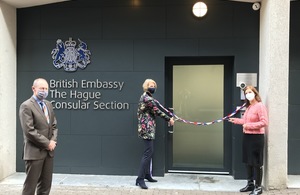Government launches Root-and-Branch review of the parole system
- review will deliver on manifesto commitment to improve public confidence
- focus on further improving openness and transparency for victims
The review will build on recent reforms to improve the transparency of the Parole Board’s work but will also look at more fundamental changes. This will include providing recommendations on immediate changes but also on whether the current model – the Parole Board – is the most effective and efficient system for deciding whether prisoners should continue to be detained.
Currently, parole hearings are conducted by a panel of between one and three members who come from a variety of backgrounds, including judges and psychiatrists, and receive extensive training. The panel considers a wide range of evidence and hears the opinions of professionals who have been working with a prisoner, for example a probation officer or prison psychologist, and listens to victims about the impact the crime had on their lives. The decision the panel must make is whether the risk a prisoner poses has reduced and can now be managed safely outside of prison.
The work of the Parole Board has increased significantly in recent years and it now holds over 30 times more oral hearings than it did twenty years ago – around 8,000 every year.
The review will consider:
- whether the constitution and status of the Parole Board needs to change in order to better reflect the court-like decisions it takes and to make sure it has the necessary powers.
- whether alternatives such as a tribunal might deliver the parole function in a more efficient way.
- whether additional measures are needed to strengthen its powers, for example specific new legislative powers to compel witnesses to attend hearings and to enforce the directions it makes, in addition to its existing powers as an independent judicial body
The launch fulfils a manifesto commitment aimed at improving public trust and confidence in the parole system and comes a month after the Lord Chancellor unveiled plans to overhaul sentencing so that sexual and violent offenders serve longer jail time.
Launching the review, Justice Minister Lucy Frazer QC, said:
Over the last 2 years, our reforms have made the Parole Board’s work more transparent and easier to understand for victims and the wider public.
We now have the opportunity to take a more fundamental look at the system to ensure it continues to protect people by releasing offenders only when it is safe to do so and does this in the most effective way.
In May 2018, the Parole Board rules were changed to allow it to produce summaries explaining why decisions have been taken and it has since issued over 3,000 to victims, the media and others who have requested them.
Last year, the government created a mechanism allowing the Lord Chancellor, victims and prisoners to more easily challenge Parole Board decisions that appear irrational or procedurally flawed without having to go to the courts.
The Root-and-Branch review will consider the effectiveness of these reforms and look at whether further change is needed to improve the openness and transparency of the parole process.
The first step will be a public consultation launching today inviting views on whether victims should be allowed to observe parole hearings and whether the media and wider public could have greater access to hearings, while also avoiding the risk of making it harder for the Parole Board to make the best decisions to protect the public. At present, victims are entitled to read a statement about the impact of an offender’s crime but cannot attend the rest of the hearing because of the sensitive nature of what is discussed. It might be medical information about a prisoner but parole hearings also often hear graphic accounts of their crimes which might be distressing to victims and prisoners may be less forthcoming if hearings were held in public.
Any move to greater openness needs to avoid making it harder for the Parole Board to make the best decisions to protect the public. Parole Board panel chairs can also invite in observers, but this is generally only used for professionals in the criminal justice system. There are also practical considerations such as the limited facilities and security implications for public hearings given the overwhelming majority occur in prisons.
The government has also today published a ‘Tailored Review’ of the Parole Board itself, conducted over the last 18 months, in line with the Cabinet Office requirement to review all public bodies at least once every parliament. The review made a number of recommendations to the Parole Board, HM Prison & Probation Service and the Ministry of Justice to improve timeliness and use its existing legal powers more effectively. The root-and-branch review will take account of those findings but will be a wider examination of the parole system as a whole and not just the function performed by the Board itself.
The Root-and-Branch review’s terms of reference have been published online and it will aim to report to the Lord Chancellor in Summer 2021.
